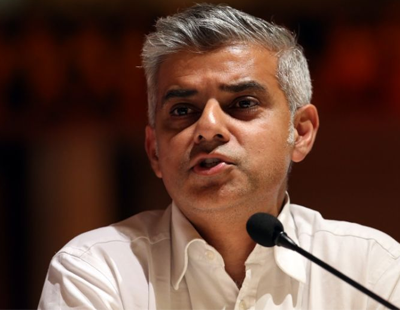Khan kickstarted his campaign for a second stint in office at a housing estate in Hackney on Tuesday. He said: “The case for rent controls is now absolutely undeniable. But Tory ministers have blocked us from introducing our plans for rent controls in London and have simply said no.”
He added: “That’s why today I am making the mayoral election on May 7 a referendum on rent controls – showing Londoners that I will stand up for renters.”
He insisted Johnson ‘will have to give us the powers we need, because if he refuses to do so he will be denying the express democratic will of millions of Londoners.’
“And as we have all heard Boris Johnson repeatedly say himself, the democratic will of the people must be respected and it is not for politicians to frustrate it,” Khan added, with a clear swipe at Johnson’s stance on Brexit.
The Mayor, who is a long-time backer of restrictions on rents, insisted his rent control plan would establish a new London private rent commission, with renters on its board. They would then implement and enforce measures to control rents.
Khan has previously spoken of his frustration at being denied the powers he needs to impose some form of rent controls in the capital.
A number of other major cities have rent control schemes in place, including Berlin (where rents are controlled within and between tenancies) and New York, where rents are capped by the NYC Rent Guidelines Board. Others, meanwhile, are ‘stabilised’ or reset between tenancies. Rent controls also exist in Los Angeles and San Francisco.
However, research carried out last year by the Residential Landlords Association (RLA) claimed that rent controls cause damage to tenants by drying up the supply of rental homes and in some cases increasing rent.
The Centre for Cities think-tank also warned last year that rather than helping make London open to everyone, strict rent controls would close off the capital to new residents and divide the city’s renters into winners and losers.
As part of his pitch to Londoners – who are as likely to rent than own in a city where there are approximately 2.4 million private tenants – Khan said he was also considering ending ‘no-fault’ evictions (something central government is already trying to implement) and increasing minimum landlord-to-tenant notice periods to four months.
Shaun Bailey, the mayoral candidate for the Conservatives, said rent control proposals had failed wherever they've been tried elsewhere, leading to longer waiting lists and higher rent.
“This is a transparent attempt to distract from Sadiq Khan’s abysmal record on building the homes London needs,” he commented. “Despite being given £5 billion from the government to build them, he has only delivered a tiny fraction of the new homes he promised.”
Dean Clifford, co-founder at London developer Great Marlborough Estates, added: “At a time when Londoners are crying out for good quality rental accommodation, the Mayor is effectively looking to try and slam the brakes on the built to rent sector in the capital. If we want London to be fit for the 21st century, we need to encourage more homebuilding. Rent controls will have the opposite effect and force large investors to think twice before committing to projects in the capital.”
The UK’s two main landlord trade bodies – the RLA and the National Landlords Association (NLA) – went ever further, saying that rent controls in London would be a ‘disaster' for aspiring tenants,
They said experts had warned of the danger rent controls would cause at a time when the demand for private rented homes in the capital is outstripping supply. According to research by Knight Frank, in the capital last year there were 6.1 prospective tenants for every rental listing, up from 4.7 in 2018, while the Resolution Foundation has said that holding down the true market price of private housing via rent controls rather than increasing housing supply is unlikely to succeed.
The landlord bodies – who are set to merge at some point this year – also pointed to the words of Professor Kath Scanlon, a housing expert at the London School of Economics, who last year warned that the Mayor’s rent control proposals would result in landlords simply deciding that they were no longer going to rent their properties.
John Stewart, policy manager for the RLA, and Chris Norris, Policy Director for the NLA, said in a joint statement: “Rent controls might appear attractive to those already renting but they would be a disaster for anyone looking for somewhere to rent. All they would achieve, as history and experience elsewhere tells us, is to drive landlords out of the market exacerbating an already serious shortage of homes available.”
“Instead of putting out simplistic and superficially appealing proposals in an attempt to win votes, the Mayor should focus on boosting the supply of available housing using the powers he already has.”
The Royal Institution of Chartered Surveyors (RICS) also criticised the Mayor’s plans, saying that rent controls ‘could wreck the private rented market in London’, having the effect of restricting the numbers of homes for Londoners and ‘placing pressure on local authorities to build more themselves’.
David Cox, chief executive at ARLA Propertymark, said that 'rent controls do not work', hitting hardest those they are designed to help the most. He urged the Mayor of London to learn the lessons of history.
Support for the proposals did come from campaign group Generation Rent, which said that action needed to be taken as London is one of the ‘most expensive cities to be a renter on the planet’.
Caitlin Wilkinson, a policy manager at Generation Rent, said: “Soaring rents mean the basic necessity of a secure, safe home is out of reach for too many people. Londoners are being priced out of the neighbourhoods they grew up in or forced to leave the city altogether.”
The London mayoral election 2020 will take place on May 7 to elect a mayor and 25 London Assembly members. This BBC article offers a rundown of who will be standing, from Labour, Conservative, Liberal Democrat and Green Party candidates to various independents.
Property Investor Today will be running a mayoral series in the lead-up to the May vote, outlining where each main candidate stands on housing and the property industry at large.









.png)










Join the conversation
Be the first to comment (please use the comment box below)
Please login to comment